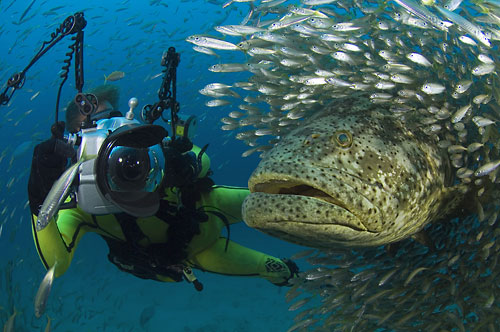State fishery managers agreed last week to continue working on stock assessments for Goliath Grouper and not bring back the issue of reopening the fishery for at least three years. The Florida Fish and Wildlife Conservation Commission again took on the task of trying to figure out how to conduct a population assessment of a fish that has been prohibited from harvest since1990. The past three assessments have been rejected by the science community. Harvest of the species has been prohibited in both state and federal waters since 1990 after decades of extreme overfishing.
For more than 10 years, the FWC staff and the board have been grappling with requests from fishermen to reopen the fishery while the dive and conservation community wants to keep it closed. There is no other fishery in the state in recent years that has generated such emotion and differing opinions. In April, the FWC board rejected a proposal to set up a lottery that would have allowed up to 100 Goliath groupers to be taken a year for up to four years. Instead, the board asked staff to come up with new ways to determine the fish’s population.
Last Wednesday, the FWC board again received information from staff that made the case that the FWC shouldn’t reopen the fishery at this time, as the Goliath grouper population has suffered another setback from a recent
FWC fishery biologist Gil McRae agreed to new assessment methods that don’t result in the death of any of the fish. However, those new methods will take at least a couple years to implement and come back with findings. Brett Fitzgerald, executive director of the Angler Action Foundation, offered his group’s services, as the foundation has established a
Fellow FWC Commissioner Mike Sole and McRae explained that the science that will be used in future stock assessments for Goliath groupers is new. “He needs the time,” Sole said. Also last week, the FWC approved a series of draft regulations for fishing for sharks from shore and bridges. The new regulations included establishing a mandatory no-cost, annual shark shore fishing permit, prohibiting chumming from beaches, prohibiting delaying the release of prohibited sharks and requiring prohibited sharks remain in the water. The draft rules also require the use of cutters and non-offset, non-stainless steel circle hooks.
The FWC will give a final reading and finalize the regulations sometime next year.
Catching and Releasing Goliath Grouper
What to do when you’ve caught a goliath grouper?
- Harvest and possession
has been prohibited in both state and federal waters off Florida since 1990.- Must be immediately returned to the water free, alive and unharmed.
- Photographs can be taken but only during the active act of release. Photographs or any other activities such as measuring the fish should not delay release in any way.
- Large goliath groupers should be left in the water during release. The skeletal structure of large goliath grouper cannot adequately support their weight out of the water without some type of damage. If a large goliath is brought on-board a vessel or out of the water, it is likely to sustain some form of internal injury and therefore be considered harvested.
- Removing smaller goliath groupers from the water to remove hooks is not necessarily a bad practice, but this process must be done with care, using proper fish handling techniques, and the fish must be returned to the water as expeditiously as possible.
- Learn more about Fish Handling and maximizing fish survival when practicing catch and release.

